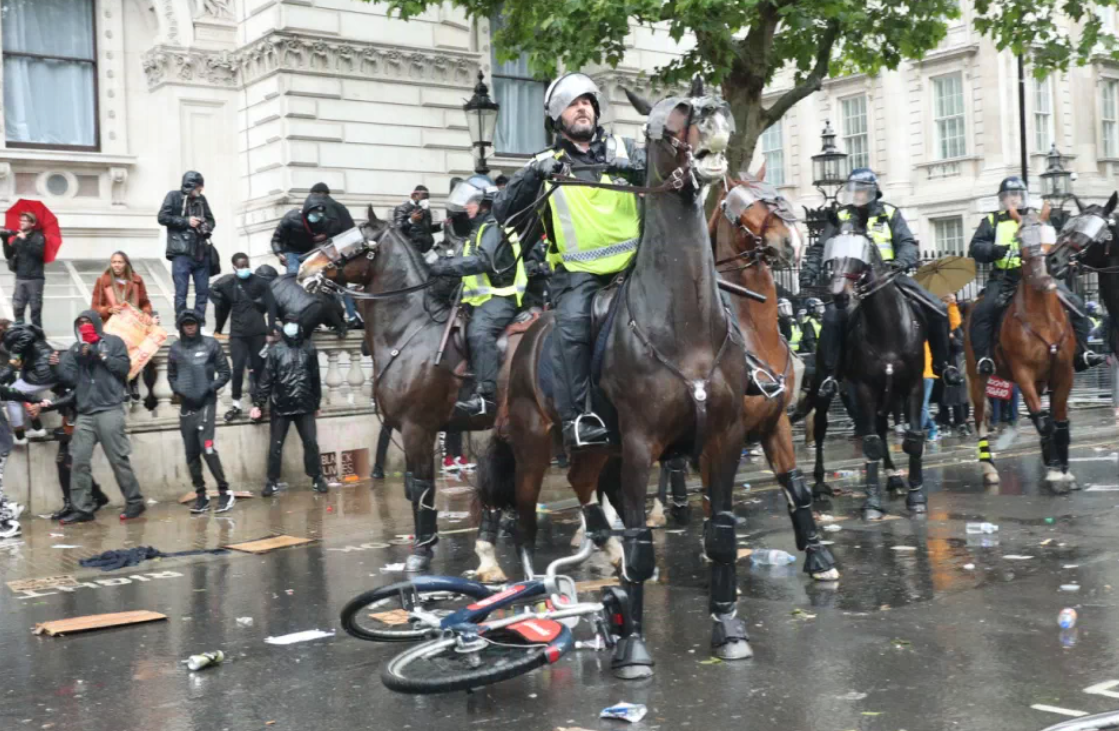Black people have been worrying about over-policed protests for decades – nobody listened
It’s quite something to behold, actually, this grand moment of awakening to the concept of minoritised groups being over-policed

Very few decision makers questioned whether the police’s approach to protest was heavy-handed until now and this is because it’s white people raising these concerns.
Prior to this, peacefully protesting Black people were talking, shouting, screaming that their civil autonomy and legal right to protest were being infringed by officers, yet this has never lead to the mass discourse we’re now witnessing. It’s quite something to behold, actually, this grand moment of awakening to the concept of minoritised groups being over-policed.
Officers clashed with crowds gathered on Clapham Common on Saturday. They were there to remember Sarah Everard, a 33-year-old marketing executive who went missing while walking home from a friend’s flat on 3 March. Serving Metropolitan Police officer Wayne Couzens, 48, has been charged with kidnapping and murdering her.
Four people were arrested for public order and coronavirus regulation breaches at the Clapham Common event on Saturday, according to the Met. A string of politicians and public figures were swift to condemn the police’s approach, including a number of prominent cross-party MPs.
It is widely accepted that the gathering in memory of Ms Everard was intended to be a peaceful event but attendees say this all changed once the police attended. The same has been said of Black Lives Matter protests. A recent report by the Network for Police Monitoring uncovered evidence of excessive use of force, failures in the duty of care, and racial discrimination in the policing of recent anti-racism protests in the UK. There was no outrage.
Read more:
Black-led protests disproportionately faced excessive interventions by police, particularly those in large cities, such as London and Newcastle, the research found. It is informed by evidence from over 100 witnesses, including protesters, legal observers, and arrested support volunteers.
Significant areas of concern include disproportionate targeting of Black protesters, with baton charges, horse charges, pepper spray and violent arrests. Evidence of “kettling”, enclosing large numbers of protesters – including children and potentially vulnerable people – in confined spaces for up to eight hours, making socially distancing impossible and with no access to toilets, food or water. There was no outrage.

Moreover, neglect of Black Lives Matter protesters experiencing violence from far-right counter-demonstrators was uncovered, with examples of a seriously injured protester being searched rather than supported and others being ignored. There was no outrage.
No, in fact the wider public were more moved by Patrick Hutchinson’s heroic rescue of a far-right former police officer who descended upon a Black Lives Matter protest on 13 June to antagonise Black people. And bless Mr Hutchinson’s heart for doing that, but the point of why he decided to go there in the first place, to help protect peaceful Black protestors, has long been lost.
Meanwhile, the home secretary, Priti Patel, referred to anti-racism campaigners who took to the streets as “thugs”. Over one weekend in June, police arrested a total of 135 people involved in around 200 Black Lives Matter protests.
Now, let me be clear. No one should feel unsafe walking the streets or navigating their daily lives – that goes for both white women and Black people. There are important parallels to be drawn between the sentiments behind Black Lives Matter protests and the tragic loss of Ms Everard’s life. It is underpinned by a resounding call for justice.
And yet instances of protest across the groups could not be treated more differently. The language and attitudes towards both, across politics and media commentary, are diametrically opposed.
Prime Minister Boris Johnson slammed the anti-racism protests as “thuggery” describing a scenario whereby protesters attacked police; however, like Ms Everard’s vigil, those who attended point to a heavy-handed approach by the police as the cause of contention.
But, by contrast, the PM rightly said society and the government needed to ensure that women’s complaints about violence are properly heard.
Ms Patel said footage of the Clapham Common gathering was “upsetting” and in a Commons statement she added that “too many” women felt unsafe in public. She has failed to extend such sympathy for Black victims of violence and racism – or protestors who she also described as “thugs”. Thugs is often used as dogwhistle terminology for Black people who are seen as non-compliant.
Speaking to Sky News on Sunday, the former detective superintendent of Scotland Yard, Shabnam Chaudhri, compared Ms Everard’s vigil to BLM protests and said, “this wasn’t Black Lives Matter, this was a sensitive issue, where a woman has been murdered tragically”. The ex-copper was forced to apologise for her words following intense, deserved backlash.
I put it to you that BLM protests are a vigil in and of themselves – the coming together of individuals to commemorate every Black person, near and far, who lost their lives following contact with the police and offer solidarity with those who bear the brunt of institutional racism every single day.
I further submit that every vigil is a protest against some form of injustice and loss – be it of life or of liberty. Each should be dignified with the same approach and empathy.
Stretching back from the 1980s to present day, there are numerous cases of Black people who have died after coming into contact with British police. Names such as Cynthia Jarrett, Joy Gardner, Mark Duggan, Sarah Reed and Kevin Clarke.
Yesterday was the 10th anniversary of the death of Smiley Culture, a reggae star who sustained a knife wound to the heart while in police custody. In response to this, Black people have always peacefully mobilised and marched, held their own vigils and been met with heavy police presence.
And the data backs this up. Irrespective of whether it’s a protest or not, Black people are over-policed. I’m not stating anything new here:
- Black people are over three times as likely to be arrested as white people
- Black people are nine times more likely to be stopped and searched by police than white people
Even during the early stage of the pandemic, data revealed that Black, Asian and minority ethnic people in England were 54 per cent more likely to be fined under coronavirus rules than white people under distancing regulations recorded from 27 March to 11 May.
If you ever required any reminders that society still has a long way to go in terms of rectifying its own racism, you need only refer to these statistics.
Bookmark popover
Removed from bookmarks